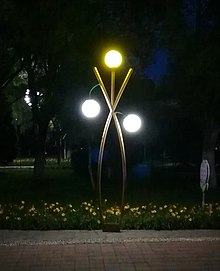Streetlight effect

The streetlight effect, or the drunkard's search principle, is a type of
A policeman sees a drunk man searching for something under a streetlight and asks what the drunk has lost. He says he lost his keys and they both look under the streetlight together. After a few minutes the policeman asks if he is sure he lost them here, and the drunk replies, no, and that he lost them in the park. The policeman asks why he is searching here, and the drunk replies, "this is where the light is".[2]
The anecdote is attributed to Nasreddin. According to Idries Shah, this tale is used by many Sufis, commenting upon people who seek exotic sources for enlightenment.[3] Outside of the Nasreddin corpus, the anecdote goes back at least to the 1920s,[4] and has been used metaphorically in the social sciences since at least 1964, when Abraham Kaplan referred to it as "the principle of the drunkard's search".[5] Noam Chomsky, for instance, uses the tale as a picture of how science operates: "Science is a bit like the joke about the drunk who is looking under a lamppost for a key that he has lost on the other side of the street, because that's where the light is. It has no other choice."[6]
See also
- McNamara fallacy – Erroneous reasoning based solely on numeric metrics
References
- PMID 25805758.
- ISBN 9780385079662.
- ISSN 0096-3402. Retrieved January 8, 2017.. Smith & Armstrong. p. 94. Retrieved January 8, 2017 – via Google Books.
- United States Senate Committee on Military Affairs (1945). Hearings on Science Legislation (S. 1297 and Related Bills): Hearings Before a Subcommittee of the Committee on Military Affairs, United States Senate, Seventy-ninth Congress, First Session, Pursuant to S. Res. 107 (78th Congress) and S. Res. 146 (79th Congress) Authorizing a Study of the Possibilities of Better Mobilizing the National Resources of the United States. U.S. Government Printing Office. Retrieved January 8, 2017 – via Google Books.
- Alabama State Bar Association (July 1926). Report of the Organization and of the... Annual Meeting of the Alabama State Bar Association - ISBN 9781412836296. Retrieved October 8, 2014 – via Google Books.
- ISBN 0262024187. Retrieved July 23, 2022 – via Google Books.
Further reading
- Iyengar, Shanto (1993). "The Drunkard's Search". Explorations in Political Psychology. Duke Studies in Political Psychology. Duke University Press. ISBN 978-0-8223-1324-3.
- ISBN 978-0-226-67545-9.
